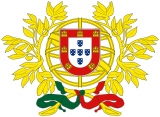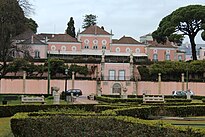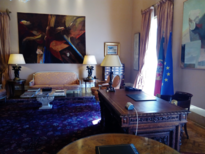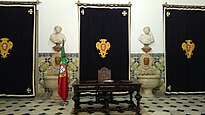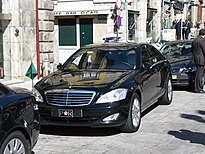|
President of Portugal
The president of Portugal, officially the president of the Portuguese Republic (Portuguese: Presidente da República Portuguesa, pronounced [pɾɨziˈðẽtɨ ðɐ ʁɛˈpuβlikɐ puɾtuˈɣezɐ]), is the head of state and highest office of Portugal. The powers, functions and duties of prior presidential offices, and their relation with the prime minister and cabinets have over time differed with the various Portuguese constitutions. Currently, in the Third Republic, a semi-presidential system, the president holds no direct executive power, unlike his counterparts in the United States and France. However, even though he is in general a ceremonial figure,[2] he holds some powers not that usual in parliamentary systems: one of his most significant responsibilities is the promulgation of all laws enacted by the Assembly of the Republic (parliament) or the Government (an act without which such laws have no legal validity), with an alternative option to veto them (although this veto can be overcome in the case of laws approved by Parliament) or send them to the Constitutional Court for appreciation of whether they violate the Constitution. This and other abilities imply that the president of Portugal does not fit clearly into either of the three traditional powers – legislative, executive and judicial –, acting instead as a sort of "moderating power" among the traditional three.[3] The current president of Portugal is Marcelo Rebelo de Sousa, who took office on 9 March 2016. RoleThe Portuguese Third Republic is a semi-presidential system. Despite being a rather ceremonial figure, unlike most European presidents, who are at large ceremonial figures, the Portuguese President is vested with more extensive powers. Although the prime minister and parliament oversee and direct much of Portugal's actual governmental affairs, the president wields significant influence and authority, especially in the fields of national security and foreign policy, however, always on the advice of the Government and the approval of Parliament. The president is the supreme commander of the Armed Forces, holds the nation's most senior office, and outranks all other politicians.[4] Prior to the Carnation Revolution, the powers of the presidency varied widely; some presidents were virtual dictators (such as Pais, and Carmona in his early years), while others were little more than figureheads (such as Carmona in his later years, Craveiro Lopes, and Américo Tomás). During the Estado Novo, the president was nominally vested with near-dictatorial powers, but in practice supreme power was held by the President of the Council of Ministers (António de Oliveira Salazar and Marcelo Caetano).[5][6] Government nominationThe president's greatest power is his ability to appoint the prime minister. However, since the Assembly of the Republic has the sole power to dismiss the prime minister's government, the prime minister named by the president must have the confidence of a majority of representatives in the assembly, otherwise the prime minister may face a motion of no confidence. The president has the discretionary power to dissolve parliament when he/she sees fit (colloquially known as the "atomic bomb" in Portugal),[7] and President Jorge Sampaio made use of this prerogative in late 2004 to remove the controversial government of Pedro Santana Lopes, despite the absolute majority of deputies supporting the government.[8] Armed ForcesIn 2003, President Sampaio also intervened to limit the Portuguese participation in the Iraq War – as Supreme Commander of the Armed Forces he forbade the deployment of the Portuguese Army in a war that he personally disagreed with, clashing with the then–prime minister José Manuel Barroso.[9] Because of this, the Government eventually deployed 128 members of the National Republican Guard (GNR) to Iraq from 2003 to 2005, this being possible because the GNR, despite being a military force, was not part of the Armed Forces.[10] PowersThe constitution grants the following powers to the president:[11]
ElectionUnder the Portuguese Constitution adopted in 1976, in the wake of the 1974 Carnation Revolution, the president is elected to a five-year term. In order to be eligible, any citizen has to be of Portuguese origin and above 35 years old.[4] He may be reelected any number of times, but not more than twice in a row.[11] The official residence of the Portuguese president is the Belém Palace in Lisbon.[12] The president is elected in a two-round system: if no candidate reaches 50% of the votes during the first round, the two candidates with the most votes face each other in a second round held two weeks later. However, the second round has only been needed once, during the 1986 presidential election. To date, all of the elected presidents since the Carnation Revolution have served for two consecutive terms, and presidents consistently rank as the most popular political figure in the country. During his time in office, however, the popularity of former president Aníbal Cavaco Silva plummeted, making him the second-least popular political figure in the country, just above the then-prime minister, and the first Portuguese president after 1974 to have a negative popularity.[13] By 2024, Marcelo Rebelo de Sousa also displayed negative popularity ratings.[14] SuccessionUnder article 132 of the Constitution, if the president dies or becomes incapacitated while in office, the president of the Assembly assumes the office with restricted powers until a new president can be inaugurated following fresh elections. President's residence
Belém Palace is the official residence of the President of the Portuguese Republic since 1910. Built in the 16th century by a high ranking diplomat named Manuel de Portugal, was bought by King John V in the 18th century and served as one of the residence of the Royal Family until the early 20th century.[15] Marcelo Rebelo de Sousa, current President, lives in the palace.[16] Last election2021 presidential election
Travel
Graphical timeline (since 1910) State visitsHistorical rankings of presidents
See alsoNotes
References
External links |
||||||||||||||||||||||||||||||||||||||||||||||||||||||||||||||||||||||||||||||||||||||||||||||||||||||||||||||||||||||||||||||||||||||||||||||||||||||||||||||||||||



